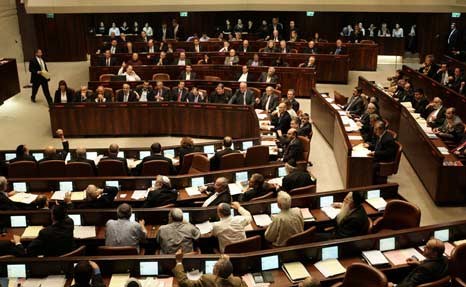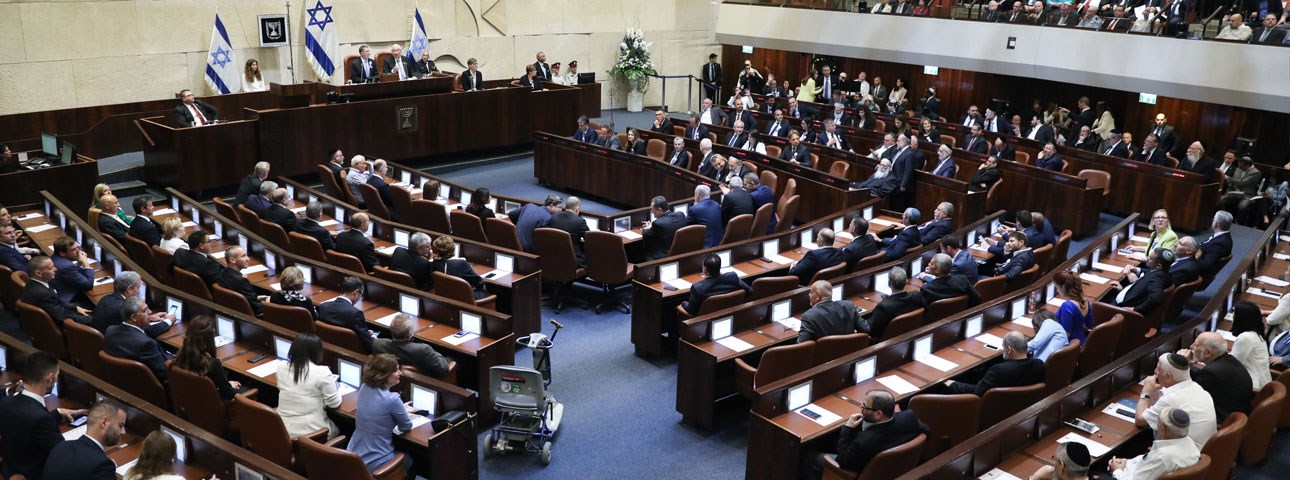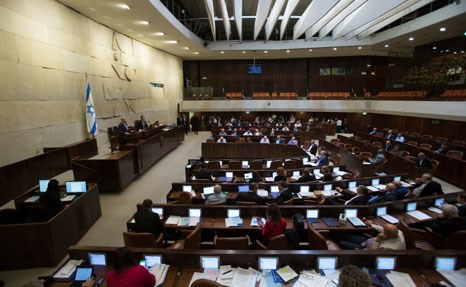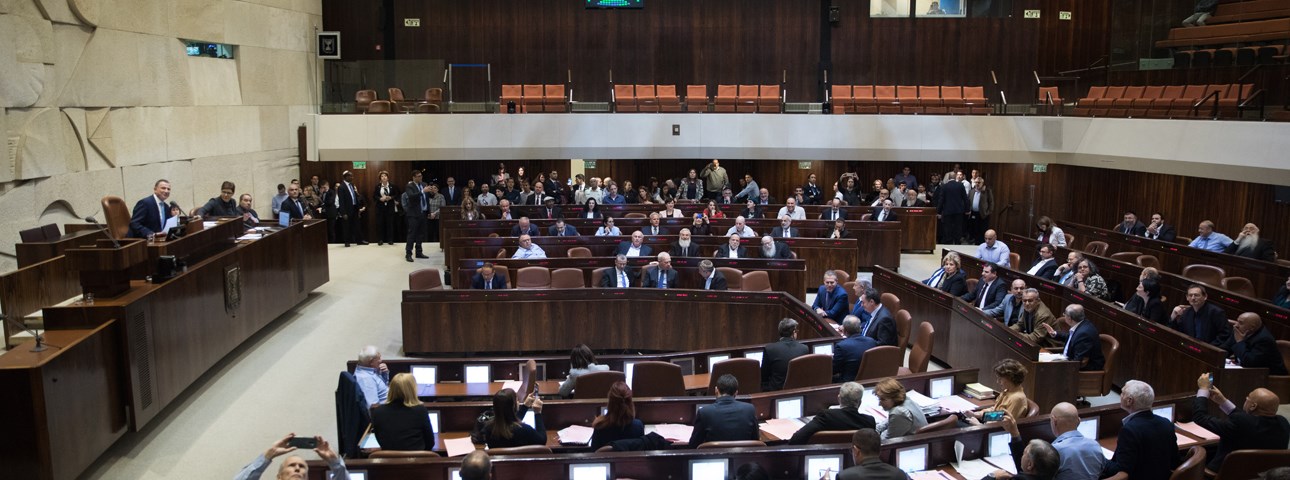

Publications Regarding Coalition
Articles

How a once-cautious Benjamin Netanyahu came to lead the most radical coalition in Israel’s history
Written By: Prof. Ofer Kenig
How can Netanyahu — a U.S.-educated and respected world leader who was cautious in his approach to building previous coalitions, and was once respectful of Israeli democratic institutions — support such a dangerous plan? Was the “writing on the wall” earlier on in his lengthy tenure?

Farewell Elections, Hello 37th Government
Written By: Prof. Ofer Kenig
The elections for the 25th Knesset assembly produced a clear result. Israel’s citizens have had their say, and the political system is now entering the next stage of the cycle: forming a new government. Over the coming days, President Herzog will consult with the representatives of the factions elected to the Knesset, and will decide whom to entrust with the task of forming a government. This will begin the process that will culminate in the swearing-in of Israel’s 37th government. What are the rules that govern this process, and what can we learn from past experience in Israel and in other countries?

The Many Ways to Dissolve the Knesset 2022
Written By: Dr. Dana Blander
The unlikely coalition that survived thanks to the one vote has lost the parliamentary majority. Does this mean that the Knesset will disperse and new elections will be held? Dr. Dana Blander explains the different ways in which the Knesset can be dissolved and discusses the relationship between these mechanisms and government stability in a parliamentary system.

Minority Governments: Why Smaller Is Not Necessarily Worse
Written By: Dr. Assaf Shapira
In the wake of the latest political crisis - can a minority government prevent yet another election?

Prime Minister from a Small Party? Impossible? Well… There are Examples
Written By: Prof. Ofer Kenig
A government headed by a prime minister who leads small faction in the Knesset - how exceptional is such a scenario and to what extent is it prevalent in parliamentary systems? Prof. Ofer Kenig analyzes examples of parliamentary democracies where the prime minister hails from a small party.

A Minority Government? A Prime Minister from a Small or Medium-Sized Party? You’d Be Surprised…
Written By: Prof. Ofer Kenig
Prof. Ofer Kenig presents examples of parliamentary democracies in which the Prime Minister is from a small party.

Israel’s Political System is Broken. Here is How to Fix It.
Written By: Yohanan Plesner
Are the fourth national elections in less than two years due to political chaos or Prime Minister Netanyahu’s legal woes?

Disbanding the Knesset for Lack of an Approved Budget Makes No Sense
Written By: Dr. Assaf Shapira
This law, unique to Israel, was meant as an incentive to avoid budgetary deadlock. Today, it sows instability.

Ireland Finally Has a Government!
Written By: Prof. Ofer Kenig
A tale of two unity governments: The coalition agreement that formed Israel's unity government is all about forcing the parties to live up to the deal. Ireland's is all about policy.

Half of Israelis Favor Applying Sovereignty
Written By: Prof. Tamar Hermann, Dr. Or Anabi
The Israeli Voice Index for May 2020 found that 50% of the public supports applying Israeli sovereignty over parts of the West Bank (Judea and Samaria) with the U.S. administration’s support (25%) and without American backing (25%)

Israel’s Cease-Fire Government Should Promote Healing, Not Division
Written By: Yohanan Plesner
Netanyahu and Gantz could use their unity government to put in place a 'democratic ceasefire' and speed Israel’s economic recovery rather than entrenching political deadlock.

Israel’s 35th Government: A Portrait
Written By: Prof. Ofer Kenig
After 18 months of political deadlock, Israel’s 35th government was sworn in - and in many ways it's quite unique.

No Justification Whatsoever
Written By: Prof. Ofer Kenig
The establishment of the Netanyahu-Gantz government required many compromises.That being said, there is absolutely no way to justify the extravagant size of the new government

The Rotation Agreement — One State, Two Governments
Written By: Dr. Assaf Shapira
The rotation mechanism agreed upon creates a governmental structure, unprecedented neither in Israel or anywhere else

Coalition Agreement – What to Expect Moving Forward
Written By: Yohanan Plesner
IDI President Yohanan Plesner held an online media briefing and Q&A session on the new coalition agreement between the Likud and Blue and White parties.

Farewell Elections, Hello 35th Government
Written By: Prof. Ofer Kenig
The strangest and most polarizing election in Israel’s history is now over. The people have spoken, and we’re now entering the next stage of the political lifecycle: forming a new government. What are the rules governing this process, and what can be learned from a historical and comparative perspective?

Unity Coalition Governments: Explainer
A unity government (or “grand coalition”) is a special type of coalition with a particularly broad base, including all the major parties represented in the parliament and can have a range of ramifications on the political system. This explainer outlines how its works in Israel and around the world.

What if Netanyahu Fails to Form a Coalition? Explainer
Written By: Prof. Ofer Kenig
What if Netanyahu fails to form a coalition? Will Israel find itself again holding elections? Although unlikely – Dr. Ofer Kenig explains the possibilities

Strengthening the 'Rule of Law' in Coalition Agreements
The Israel Democracy Institute calls on Parties to Demand Strengthening of 'Rule of Law' and 'Separation of Power's in Coalition Agreements.

Farewell Elections, Hello Government
Written By: Prof. Ofer Kenig
After an exhausting and polarizing election campaign, the people have spoken, and we’re now entering the next stage of the political lifecycle: forming a new government - Dr. Kenig explains what’s next

Plurality of Israelis Welcome Yisrael Beiteinu into Coalition, Signaling 'Desire for Right-Wing Dominance'
A plurality of the Jewish public views the addition of Yisrael Beiteinu into the government coalition over Zionist Union as a step in a positive direction, according to the latest Peace Index, released this week by the Israel Democracy Institute and Tel Aviv University.

Israel's 34th Government: A Profile
Written By: Prof. Ofer Kenig
On May 14, 2015, the 34th government of the State of Israel—the fourth Netanyahu cabinet—was sworn in. In this article, IDI Researcher Dr. Ofer Kenig presents an overview of the process of forming the government and the profile of its members.

Don't Increase the Number of Cabinet Ministers
Written By: Prof. Ofer Kenig
Dr. Ofer Kenig argues that amending the clause of the Basic Law that limits the number of ministers in the next government to 19 is not only unnecessary, but also brings about a sense of déjà-vu that the Knesset is defying the rules of the game once again.

Coalition Building: How Long Is Too Long?
Written By: Prof. Ofer Kenig
How long is too long to form a coalition? Dr. Ofer Kenig looks at how long it takes to form a government in different parliamentary democracies.

The Firing of Ministers in Israel: A Historical Overview
Written By: Prof. Ofer Kenig
The demise of the 19th Knesset was hastened by Prime Minister Benjamin Netanyahu's firing of Finance Minister Yair Lapid and Justice Minister Tzipi Livni. In the article below, IDI researcher Dr. Ofer Kenig discusses the various grounds for firing ministers in the past and how the current case fits into Israeli political practice.

The New Israeli Cabinet: An Overview of the 33rd Government of Israel
Written By: Prof. Ofer Kenig
How many parties make up the 33rd government of Israel? How many first time ministers does the cabinet have? What is the breakdown of men and women in the government? Dr. Ofer Kenig presents an overview of the 2013 Israeli cabinet.

The Haredi Draft: The Need for an Alliance of the Moderates
Written By: Prof. Yedidia Z. Stern
Prof. Yedidia Stern calls for a historic alliance between religious and secular moderates that will yield a solution that will that will yield a solution that addresses the need for ultra-Orthodox army service while taking into account the most important values of the Haredi community.

Coalition Building in Israel: A Guide for the Perplexed
Written By: Prof. Ofer Kenig
In an article specially written for the IDI website, Dr. Ofer Kenig explains the basic principles of the process of coalition building, sharing facts, figures, and comparative data.

A Coalition of Hope
Written By: Prof. Yedidia Z. Stern
Following the elections of 2013, IDI Vice President Prof. Yedidia Z. Stern hails the incoming Knesset as a unique opportunity to change the nature of the State of Israel so that it is both more Jewish and more democratic at the same time.

IDI Experts: New Coalition Presents Historic Opportunities but also Dangers
IDI experts respond to the coalition deal that brought Kadima into the government just as the call for new elections was being finalized.

The Limits of Party and Coalition Discipline
Written By: Reuven Rivlin
How much parliamentary independence should Knesset members have? To what extent must they toe their party's line? At a time when party discipline and coalitional discipline play a decisive role in determining the fate of Israeli policy and proposed legislation, MK Reuven (Ruby) Rivlin, Speaker of the Knesset, calls on parties to allow Knesset members to remain true to their conscience and to their role as representatives of the people.

The 32nd Israeli Government: The 2009 Coalition
Written By: Prof. Ofer Kenig
IDI Researcher Dr. Ofer Kenig outlines the Israeli government elected in 2009, and explains why this particular five-party coalition may not succeed.

And the Winner is...
According to Israel's Basic Law, following general elections the president appoints a Knesset Member to form the new government. In the wake of the 2009 Israeli general election, Benjamin Netanyahu was chosen – even though he did not lead the largest party. Dr. Dana Blander proposes the establishment of a clear set of rules which would automatically give the leader of the largest party the power to form the incoming government, obviating ambiguity surrounding the selection process of the Prime Minister.

